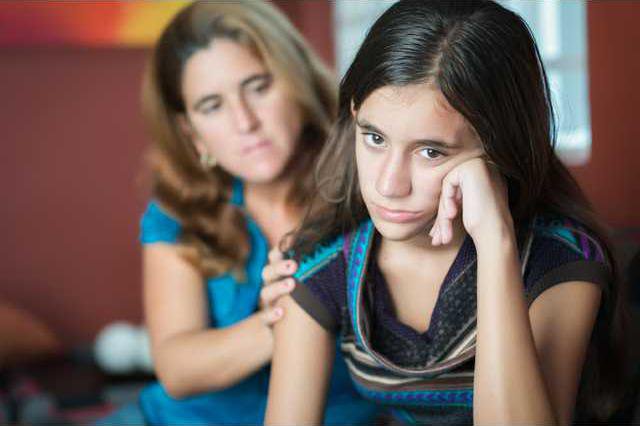Defiance can be a short-lived phase that your child is going through or it can be a permanent facet to the child's personality. Either way it is important as a parent to continue to push for a loving and caring relationship. Some cases may be harder than others, but here are some ideas to keep the relationship going.
1. Keep with routine
Everyone likes to know what is expected of them, and children are no exception. Routines build a sense of knowing what to expect, and that can create a calm environment. Plus, if your child is moving through his normal routine with little to no reminders, the interactions are generally more positive. These are also great times to praise your child for completing tasks and following directions. A relationship with a defiant child needs all the positives it can get, so praise as much as you can. Noting the little aspects is just as important, like thank you for staying calm when sister took the toy you were cleaning up.
2. Dont change traditions
Come Thanksgiving, you can almost hear your teenagers eyes roll as you sing "The Turkey Song" on the way to grandma's house. As much as the defiant child or teenager will complain about these social and often embarrassing events, they are an important piece of belonging that they do not get from friends. Family members show a sense of camaraderie and tend to be a more consistent influence throughout their life.
Even when relationships with the immediate family are feeling a bit rocky, they can usually find an extended family member they can relate to and feel a sense of acceptance. This feeling of attachment can assist in repairing other relationships and help them practice interacting in a social and healthy way. This helps the defiant person learn to live in harmony with others.
3. Listen
On the occasion that the defiant child wants to sit down and express concerns in a calm productive manner, make this a priority. Not only are you showing the child that he is a significant part of your life but you are rewarding effective communication. Really listen to him without judgment. Children are very observant and tend to notice your non-verbal cues that others miss. Make sure you are modeling good communication and behaviors, because children and teenagers imitate us (even if they dont want to) and will mirror back how you are acting.
4. Kind physical contact
Kind physical contact is going to be different for each child. Some younger kids may want to playfully wrestle with you while older teenagers may only want a brief side hug. Either way you should be available for interaction. As humans, we crave physical contact that makes us feel safe and secure. There have been cases of folks who never get a kind touch and have resorted to visits to the ER when they were not sick because the nurses were kind and provided that physical touch with a medical assessment. This is an extreme case, but not completely uncommon. Physical contact can make us feel connected and loved.
5. Eye contact
This is huge, but it is funny how we dont seem to notice when eye contact is lacking. Eye contact is pinnacle to relationship building and how we view connections. So getting as much eye contact as possible with your child is important to repairing or maintaining rapport.
If your child is willing, you can have a staring contest. To the child, you are playing a game, which can be fun, but you are also getting some great eye contact. One mother had a teenage daughter who loved makeup. She despised interaction with the family. So the mom asked her daughter to do everyone's makeup, which also involved eye contact. All family members participated (including dad), and along with some great stories, bridges were repaired. It is a simple concept, but it can make all the difference.
Coral Kinsey Goman, Ph.D., said that eye contact is connected to our survival as human beings and that we should maintain eye contact for 30 to 60 percent of our interaction time.
6. Laughter
Laughter reduces stress and pain. Any strained relationship usually has both stress and pain, and humor seems to be the key. When you laugh, you release endorphins that give you an overall sense of well-being. When you are interacting with someone during this same endorphin rush, your perspective of that person tends to shift in a more positive direction. So find something that you can laugh about with your kids pays off in the end by creating a happier relationship.
7. Think positive
Try to appreciate the defiant child's positive attributes. Children have to be creative in order to get under our skin as much as they do. They tend to be independent thinkers and are not scared of a challenge. They may be frustrating children, but as adults they will be amazing trailblazers that change the world. The key is getting them the guidance they need to learn to cooperate with others.
1. Keep with routine
Everyone likes to know what is expected of them, and children are no exception. Routines build a sense of knowing what to expect, and that can create a calm environment. Plus, if your child is moving through his normal routine with little to no reminders, the interactions are generally more positive. These are also great times to praise your child for completing tasks and following directions. A relationship with a defiant child needs all the positives it can get, so praise as much as you can. Noting the little aspects is just as important, like thank you for staying calm when sister took the toy you were cleaning up.
2. Dont change traditions
Come Thanksgiving, you can almost hear your teenagers eyes roll as you sing "The Turkey Song" on the way to grandma's house. As much as the defiant child or teenager will complain about these social and often embarrassing events, they are an important piece of belonging that they do not get from friends. Family members show a sense of camaraderie and tend to be a more consistent influence throughout their life.
Even when relationships with the immediate family are feeling a bit rocky, they can usually find an extended family member they can relate to and feel a sense of acceptance. This feeling of attachment can assist in repairing other relationships and help them practice interacting in a social and healthy way. This helps the defiant person learn to live in harmony with others.
3. Listen
On the occasion that the defiant child wants to sit down and express concerns in a calm productive manner, make this a priority. Not only are you showing the child that he is a significant part of your life but you are rewarding effective communication. Really listen to him without judgment. Children are very observant and tend to notice your non-verbal cues that others miss. Make sure you are modeling good communication and behaviors, because children and teenagers imitate us (even if they dont want to) and will mirror back how you are acting.
4. Kind physical contact
Kind physical contact is going to be different for each child. Some younger kids may want to playfully wrestle with you while older teenagers may only want a brief side hug. Either way you should be available for interaction. As humans, we crave physical contact that makes us feel safe and secure. There have been cases of folks who never get a kind touch and have resorted to visits to the ER when they were not sick because the nurses were kind and provided that physical touch with a medical assessment. This is an extreme case, but not completely uncommon. Physical contact can make us feel connected and loved.
5. Eye contact
This is huge, but it is funny how we dont seem to notice when eye contact is lacking. Eye contact is pinnacle to relationship building and how we view connections. So getting as much eye contact as possible with your child is important to repairing or maintaining rapport.
If your child is willing, you can have a staring contest. To the child, you are playing a game, which can be fun, but you are also getting some great eye contact. One mother had a teenage daughter who loved makeup. She despised interaction with the family. So the mom asked her daughter to do everyone's makeup, which also involved eye contact. All family members participated (including dad), and along with some great stories, bridges were repaired. It is a simple concept, but it can make all the difference.
Coral Kinsey Goman, Ph.D., said that eye contact is connected to our survival as human beings and that we should maintain eye contact for 30 to 60 percent of our interaction time.
6. Laughter
Laughter reduces stress and pain. Any strained relationship usually has both stress and pain, and humor seems to be the key. When you laugh, you release endorphins that give you an overall sense of well-being. When you are interacting with someone during this same endorphin rush, your perspective of that person tends to shift in a more positive direction. So find something that you can laugh about with your kids pays off in the end by creating a happier relationship.
7. Think positive
Try to appreciate the defiant child's positive attributes. Children have to be creative in order to get under our skin as much as they do. They tend to be independent thinkers and are not scared of a challenge. They may be frustrating children, but as adults they will be amazing trailblazers that change the world. The key is getting them the guidance they need to learn to cooperate with others.

